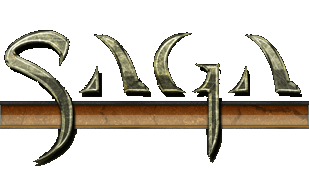Here we get a behind-the-scenes glimpse on how the new movement algorithms were developed and what's still to come.
 Dennis: What were your goals in re-writing the troop movement algorithms?
Dennis: What were your goals in re-writing the troop movement algorithms?Mark: Well, up to this point, everything in SAGA had been handled on a unit basis. For example, when you would move around a lake or around a building, the entire unit would move, but the troops themselves would often collide with mountains or buildings. We wanted it to look a little more natural.
Dennis: So how did you tackle this process? Where did you start?
Mark: Usually with designing any new system, I'll start with research. One of the perks of developing video games is that research doesn't always entail reading through textbooks - it's simply going and playing other games. I did read through several articles on systems like this, but I also went through and played many different games. After watching how a lot of other games had done it, I started to create prototypes and finally came up with a system that I really liked.
Dennis: What was the most challenging part of this project?
Mark: One of the difficult parts of it is that there are things that are very unique about SAGA. For example, as units move around obstacles, troops need to not only move away from the obstacles, but they also need to maintain their formation.
The most difficult part, however, is that at any given time in SAGA there are going to be hundreds of troops on the map - so I needed to create an algorithm that was efficient enough that we wouldn't lose performance.
Dennis: What features are you working on now?
Mark: For the movement architecture, there are adjustments that will be made. For example, right now the troops tend to move very quickly into their positions, where I'm going to make it so that they go a little bit slower, so it looks a little more natural.
Also, right now we're working to improve the AI of the enemy troops, which will be announced a little bit later on, so we have many aspects if that that we'll be working on.
Dennis: There are a lot of people out there who want to work on video games, so we figured we'd ask our staff about working in the video game industry. What is your favorite part of working as a video game programmer?
Mark: There are actually two things that I enjoy a lot. The first is that with every video game there are very unique problems to be solved, and I really enjoy finding solutions to those problems. The other thing is that in many cases you'll spend a lot of time working on something trying to get it to work - to fix something. Sometimes you'll be struggling for a while, but then you'll get it working, you get to see it running, everyone gets to see it running, and once it's in the game, it's there. Every time you log into the game or play through a battle, you get to see your work.
Dennis: And your least favorite part of being a video game programmer?
Mark: One of the hardest things is that we all have a vision of what we want to be able to do, of all the things that we want to accomplish. But due to time, resources, or even our own experience we run into restrictions. That can be frustrating sometimes. You get to a point where you have to say, "well, we'd like to do everything, but we have to just do this." That's probably the most frustrating part of it.
Dennis: What surprised you most about the job?
Mark: The thing that surprised me the most is that when I came into the industry, I had kind of an idea of the things I wanted to work on and the things I would enjoy the most. In truth, some of those things I didn't enjoy all that much. The things that I thought I would enjoy the least I really started to love doing.
Dennis: Do you have any examples?
Mark: I had never worked on an MMO before, and when I started working, I thought "Oh, well I'll enjoy working on some of the AI, some of the mechanics of the game - but I don't know if I'll really want to deal with a lot of the network stuff, per se." In reality, I've come to enjoy that the most, and it's actually become the most interesting to me.
Dennis: Thank you for your time, we'll let you get back to work!
Thanks for reading, next time we'll be interviewing Adam Ellis, one of our quest writers.




No comments:
Post a Comment